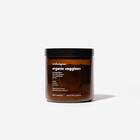A Beginner’s Guide to Protein Powders, According to Nutritionist Maya Feller
Going back to your pre-pandemic routine might take some time, but protein powders can at least give you a much-needed energy boost.

Protein powders are everywhere. The nutritional supplement is exceedingly popular among everyone from fitness buffs looking to bulk up to moderately active folks simply aiming to live a bit of a healthier lifestyle. Whether your goal is to tone your tris, thighs, and abs, or fuel your body with some extra nutrients to boost energy throughout the day, there’s a protein powder out there to help you achieve just that.
Now that many of us are returning to some type of "normal," you might want to consider adding a protein-packed supplement to your routine as you gear up for more day-to-day activity. So, to help you choose the right one, we talked to registered dietitian, nutritionist, and author of The Southern Comfort Food Diabetes Cookbook: Over 100 Recipes for a Healthy Life, Maya Feller to tell us what exactly protein powder is, how it can help you feel more energized, and which ones are best to support a variety of needs.
What is a protein powder?
Feller: Protein powder is exactly what it sounds like, powdered protein. It is a very concentrated source of protein made from an isolated food source such as whey, casein, soy, or peas. Consumers should make informed choices and read the nutrition facts and ingredients labels before purchasing [one]. Additionally, it’s important to know and understand one's current health. For example, do they have any food sensitivities, intolerances or allergies that need to be taken into consideration?
For some, using protein powders can be an efficient way to ensure protein needs are being met. It’s also important to note that more protein does not always equal better. If you're getting enough protein in your pattern of eating from food sources (and most of us are), chances are you may not need a protein powder supplement.
When is the best time to take our protein powder?
Feller: This is really dependent on the individual and why they are using the protein powder, also if it’s being used alone or incorporated into food or beverage. Most protein powders that are made are versatile in their timing of consumption. People that are engaged in intensive training or targeted workouts may benefit from consuming protein powder as a part of their post-work out recovery, while others may want to incorporate it as a part of a quick breakfast or snack.
How often should we consume protein powders?
Feller: Protein powders are considered supplements, and they should be used to supplement the pattern of eating, not replace it. Consumption needs to be individualized so there is no blanket recommendation.
Feller’s Favorite Powders
Feller: I use [these powders] in smoothies, pancakes, waffles, and sometimes even soups.
Shop Feller's Favorites
Best Powders to Keep You Going All Day Long
Feller: Read those nutrition facts labels and skip the powders that are full of added sugars or any fillers that you don't want. I like ones that have a mix of vegetables including sea veggies as well.
Shop Powders to Promote Energy
Protein Powders for Vegans
Feller: Common protein sources for vegan protein powders are made from pea, hemp, brown rice, or soy protein. Most vegan protein powders are quite similar, the main difference is their amino acid profile. For someone looking to get the full 9 essential amino acid profile from a powder, choose hemp protein, this would be most helpful for someone who consumes limited amounts of other plant-based protein sources. Powders made from pea and brown rice alone do not contain the full amino acid profile. However if they contain two or more sources of protein, such as pea and brown rice protein combined, they will contain the full amino acid profile.
Shop Powders for Vegans
Protein Powders for People Who Exercise Often
Feller: A protein powder that contains some carbs along with protein are going to help support recovery after exercise. For individuals who are heavy weight lifters, a higher protein powder will help to support muscle synthesis. However, formulas which have large amounts of protein with [more than] 40 grams are usually unnecessary, as the body can only absorb around 30 grams of protein at once. The excess protein will be eliminated or stored as fat in the body.
Shop Powders That Support Your Exercise Routines
Interview has been edited and condensed for clarity

















